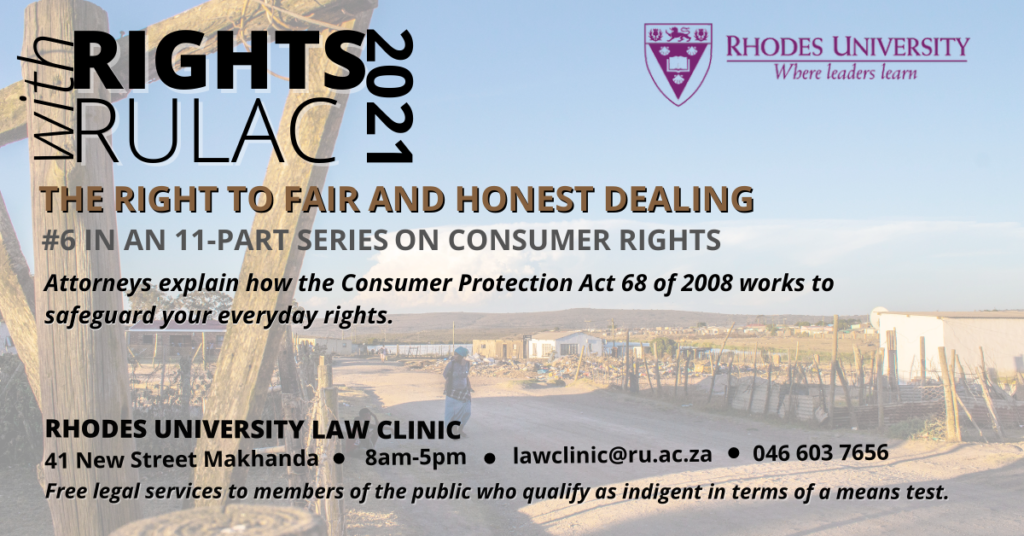By SIZIPHIWE YUZE
Have you ever felt harassed, or misled by a supplier, or perhaps been lured into a pyramid scheme? If you have, then this article is for you.
One of the important purposes of the Consumer Protection Act (CPA) is that it protects consumers from behaviour by suppliers during the precontractual negotiation process that is considered to be “unconscionable”.
The word “unconscionable” is defined specifically to include the use of physical force, coercion, undue influence, inappropriate pressure or harassment. As such, no supplier or agent may use any of these techniques when marketing or supplying goods, negotiating services, or demanding payments for goods and services.
It is also unlawful for a supplier to knowingly take advantage of a consumer who is mentally ill, disabled, cannot read or write, is ignorant, or cannot understand the language of an agreement.
A significant section of the CPA (section 41) deals with the most common form of unfair and dishonest contractual behaviour: making misrepresentations. Our law has always frowned upon this form of negotiation tactic, especially where it is done fraudulently. The section reinforces the general prohibition by providing an extensive list of specific forms of conduct in the consumer/retail environment that will be considered misleading or deceptive.
If you have ever been convinced to join a scheme where you were recruited to put in money and you would then have to recruit other people for you to make money down the line, then that was likely a pyramid scheme. The CPA explicitly prohibits pyramid schemes.
The characteristics of a pyramid scheme are that there is no product or a product of little value is being purchased by the newest members; new members are recruited to ensure the financial benefit for existing members rather than to sell a product or render a service of actual value; and the main source of income generated is from the introduction of new members and not through investment or other forms of wealth creation.
The purpose of a pyramid scheme is that new members of the scheme fund the “investments” of existing members at the top of the scheme. As soon as new members stop joining the scheme, the scheme falls apart, and the new members lose their money. The bottom line is that a pyramid scheme promises returns which are too good to be true. Since such schemes are unlawful, founding members or any persons involved in such a scheme may be charged with various serious criminal offences.
The CPA further protects consumers against the overselling of goods and overbooking of services. Unfortunately, this is a common practice in many industries. For example, you may have booked a service (eg purchased a plane ticket for a flight), and you are informed that there is no space for you, or you may have bought and paid for something, only to be informed it is no longer available.
The CPA prohibits suppliers from accepting payments for goods and services where there is no intention to supply those goods and services, or if the supplier intends to supply goods and services that are materially different from goods and services in respect of which payment was accepted. A supplier must honour a commitment to supply goods or services at a specified date and time.
If the supplier fails to supply goods or services on a specified date or time due to insufficient stock or capacity, then the supplier must refund the consumer the amount, with interest at the prescribed rate from the date on which the amount was paid to the date of reimbursement. A supplier cannot escape liability for a shortage of stock or capacity “due to circumstances beyond the supplier’s control”, if the shortage results from the supplier’s lack of diligence.
The CPA therefore plays an important role in protecting consumers by creating a legal framework for fair and honest dealing. It sets out to reduce the difficulties which vulnerable consumers might face from dishonest negotiation tactics and trade practices.
- Siziphiwe Yuze is an attorney at the Rhodes University Law Clinic
Know your rights as a consumer
This 11-part 2021 series is written by attorneys at the Rhodes Law Clinic. The articles cover various aspects of consumer rights in terms of the Consumer Protection Act 68 of 2008. Here are the articles published to date:
#1 As a consumer, do you have rights?
#2 The right to equality and the right to privacy
#4 The right to disclosure and information


